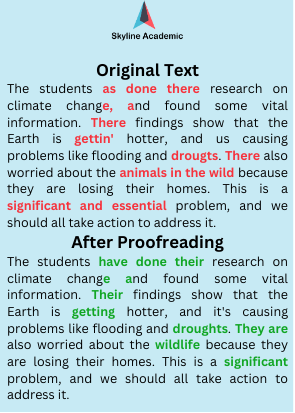Would you ever message your boss, “Hey buddy, all set?”. No, right? When speaking with friends, a casual tone is appropriate, but when communicating with your boss, it is important to use a more formal tone and display a higher level of communication skills.
The same goes for academic writing. To communicate, it’s important to choose the right words, use a suitable format and style, and maintain a clear and structured sentence arrangement. Why? Because that’s what effective academic writing requires.
What is Academic Writing?
Academic writing is all about being clear and specific. It is a formal style of writing that is used in scholarly publications and universities. Good academic writing requires effective planning, drafting, and unbiased opinions. However, before delving into this, we should focus on the basic tips to improve writing skills.
But the question is, how can you achieve that level of skill which is the foundation of writing an academic essay? 
Useful Tips to Improve Academic Writing
If you’re looking to improve your academic writing abilities, begin by implementing these three helpful techniques:
1. Be Clear, Concise, and Use Active Voice
The clarity in your writing is of paramount importance. It helps the reader to understand your work effortlessly. Without any clarity in your work, readers might misinterpret the idea shared by you. Therefore, it is advised to use an active voice that will enhance the readability of your writing. Let’s say:
Passive Voice: “The thief was being arrested by the police”.
Active Voice: “Police arrested the thief”.
The first sentence contains more words and needs some extra attention to understand the situation. Although the second sentence is not wrong, but, complex sentences or unnecessary jargon can leave the reader confused and will ultimately lose their focus. Hence, always prioritize clarity and simplicity over verbosity while writing an effective academic paper.
Pro Tip
Prefer concise writing to avoid the use of unnecessary words that don’t matter.
For Example:
Original Sentence:
The committee members held a discussion regarding the proposed budget, and they reached a unanimous consensus that the budget should be approved.
Concise Revision:
The committee members discussed the proposed budget and unanimously approved it.
2. Read, Write, and Cite
Develop a reading habit and it will do wonders in improving your academic writing abilities. It should include research papers, a thesis, essays, and what else you find interesting. Observe the writing patterns and ask yourself the following questions:
- What writing style is common in most of the research papers?
- How are the structures of the sentences formed?
- What is the most appropriate font and size?
- How can I make my writing seem sincere and engaging?
- How does referencing maintain academic integrity?
Such questions will increase your thirst for knowledge and will give you a tremendous kick to keep getting inspiration by reading others’ writing material.
Secondly, never stop writing. Learning is a never-ending process. The more you read and write, the more you become a remarkable professional academic writer.
Search for your inadequacy and then start working on your goals. Writing will surely make you realize what are the main points you are lacking and where you need improvement. Otherwise, Skyline Academic is always just a click away to help you elevate your ideas by getting guidance from our experts.
Lastly, don’t forget to cite your work to enhance the originality of your work.
Pro Tip
Always avoid second-person pronouns like “YOU” to maintain the tone of writing.
3. Always Proofread
A lot of academic writers find it boring to proofread. No matter how successful you get, you have to proofread because this is the essential and final step in refining your academic writing. Now, what proofreading is actually? Is it a glance at the written material and be like oh! It’s the best.
No, it’s time to give you the best proofreading tips. This step will enhance the quality of your academic writing by removing typos and ensuring stylistic consistency.
That’s what you should focus on while proofreading your academic writing and you will promisingly increase the readability and quality of your writing ten times better than before.
- Never proofread just after completing your writing material. This will be of no use. Instead, get away from your writing space. Give yourself a break, even if it’s for 2 minutes. Roam around or just sit somewhere else. Then start reading again.
- Remember, overdoing is as bad as lacking. Maintain a balance and shorten those sentences that seem inappropriately long.
- Look for typos like spelling errors, confused word choices, redundancy, brevity, punctuation mistakes, and missing or excess spaces.
- Run the grammar checker to remove your grammatical errors.

Highlighted Mistakes
In the above-mentioned example, after proofreading the errors are removed that has elevated your writing.
- “has done” is changed to “have done” for the correct use of verb tense.
- “there” is changed to “their” to indicate possession.
- “change, and” is converted to “change and” to remove unnecessary punctuation.
- “gettin’ is changed to “getting” to maintain the formal tone of academic writing.
- “drougts” is changed to “droughts” for correct spelling.
- “The’re” is changed to “they are” or “they’re” for correct use of apostrophes.
- “animals in the wild” is changed to “wildlife” to avoid unnecessary wording.
- “significant and essential” is changed to “significant” to avoid redundancy.
Therefore, submit your research paper or any other writing material before proofreading, as it will help you point out your errors and give you a chance to show improvement where it’s needed.
Lastly, if you still are not satisfied with your work, consider seeking external feedback if you want to excel in your academic writing. Connect with Skyline academics’ experts and they will help you to uncover areas of improvement that you might have overlooked.
By working on these points, you will see a remarkable difference in your academic writing abilities which will automatically boost your confidence.
Useful Tools for Academic Writing
There are many tools that ensure a smooth and easy writing process. However, we will highlight the four of them below.
Proofreading Tool
You can use a proofreading service to make your writing free from any sort of accidental mistakes whether they are grammatical errors, punctuation, or spelling mistakes. After scanning, these tools highlight the areas of concern and suggest corrections to help you write a clear and smooth academic paper.
Plagiarism Detection Tool
Sometimes you might have encountered unintentional plagiarism, therefore, these tools will help you to detect the copied content whether it is taken from any available resource or generated by ChatGPT.
Citation Generator Tool
This is the crucial step in writing academic writing to avoid plagiarism by giving credit to the original writer. The citation generator tools will ensure that your text is thoroughly researched and free from plagiarism.
Conclusion
Academic writing is not rocket science. As everything needs proper understanding, focus, and practice, so does it. Nothing can be achieved overnight. It needs some real dedication to achieve the desired goals.
All of it requires proper sentence formation, a formal tone, error-free grammar, amazing word choices, and some effective feedback. If you need any sort of guidance in sentence structuring or essay formation, Skyline Academic will provide you with all these services at a reasonable price.
Seek assistance from our experts now and empower your writing skills!
